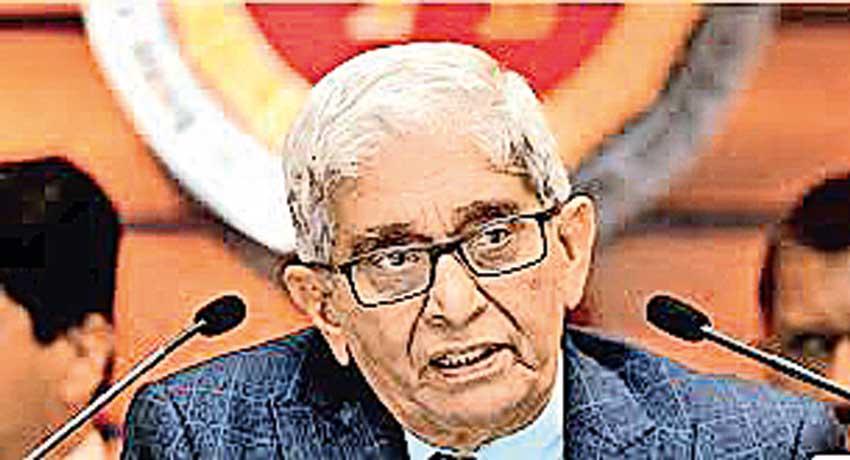05 Jan 2021 - {{hitsCtrl.values.hits}}
 Prof. W.D. Lakshman
Prof. W.D. Lakshman
By Nishel Fernando
With Sri Lanka’s economy estimated to have recorded a contraction in 2020, the country’s Central Bank (CB) yesterday assured continuous monetary and fiscal interventions to support the economy to regain its “lost momentum” to the COVID-19 pandemic and to return to the envisaged high growth path.
“The Central Bank is of the view that continued support through monetary and fiscal interventions is essential to provide adequate impetus to the economy amidst the challenging domestic and global macroeconomic conditions,” Central Bank Governor Prof. W.D. Lakshman said yesterday, presenting Road Map 2021, which contained the monetary and financial sector policies for 2021 and beyond.
The Central Bank estimates the economy to have contracted around 3.9 percent in 2020, as the economic recovery in the fourth quarter was slowed down due to the outbreak of the second wave of COVID-19 in the country.
“The marginal decline in the first and the relatively large decline in the second quarter of 2020 were followed by a marginally positive growth in the third quarter.
With observed developments in the fourth quarter, we expect the economy to record an annual contraction of around 3.9 percent,” Prof. Lakshman said.
The country’s GDP contracted 5.3 percent during the first nine months of the year. The International Monetary Fund (IMF) has projected the economy to contract by 4.6 percent in 2020.
Prof. Lakshman expects that the economy would require “some time” to sustainably realign itself with the envisaged high growth path.
Further, he noted that the growth-conducive policy measures introduced during last year are yet to be to effectively transmitted to the real economy and the transmission process to take further time.
In order to support the envisaged economic recovery, he assured that the Central Bank would continue with the prevailing accommodative monetary policy stance throughout the year.
Accordingly, the Central Bank yesterday announced plans to establish a permanent single-digit interest rate structure in the economy to promote investment and entrepreneurship in the country, laying the much-needed foundation for sustained high economic growth path.
Meanwhile, the Governor ruled out the potential large-scale demand-driven inflationary pressures that could arise from the loose monetary policy in the near term.
“Until the economy reaches its full potential, it is unlikely that there would be any notable domestic demand pressures, despite the large monetary expansion witnessed at present. The Central Bank will continue to remain vigilant but is confident that inflation will remain within the targeted range of 4-6 percent over the medium term,” he elaborated.
However, he noted that the Central Bank would be closely monitoring developments to avoid any strong demand-driven pressures on inflationary trends.
Further, the Central Bank also expects the support of proactive government policies to address inflation risks that could emanate from exogenous factors such as supply-side factors and improvement of global demand.
Therefore, the Governor backed the restrictions on imports to be maintained.
“For the sustainability of the low interest rate structure, it is essential that foreign exchange leakages for non-essential imports and outward investment are minimised, thereby allowing the domestic production economy to reap the intended benefits from easy monetary conditions,” he said.
Despite the negative impact, he pointed out that the COVID-19 pandemic also exposed some of the long-standing structural weaknesses in the economy such as relative neglect of domestic production, over-reliance on foreign debt, prevalence of poverty pockets, heavily import-dependent consumption and production.
Hence, he said that the Central Bank plans to review the performance of the open economy policies introduced from 1977, allowing the country to follow a focused approach to becoming an industrial economy.
Further, he announced that they would incorporate the policy framework outlined in the President Gotabaya Rajapaksa’s policy document ‘Vistas of Prosperity and Splendour’ and Budget 2021 into economic management decisions of the Central Bank more closely moving forward.
“These features of the new macroeconomic policy framework will be incorporated into economic management decisions of the Central Bank more closely, to ensure a coordinated approach to pushing the country on to a rapid growth path and sustained prosperity,” he added.
Concluding, Prof. Lakshman stressed that extraordinary efforts are required to revive the economic confidence on a broad basis in non-partisan lines during these difficult and uncertain times.
“The severity of the challenges brought about by the pandemic cannot be addressed by the government and Central Bank alone. It requires a collaborative approach involving all the stakeholders in the economy. Only with such support and proactive decision-making and appropriate policy measures, we will be able to mitigate any future challenges and uncertainties and steer the real economy and the financial sector in the right direction,” he said.
19 Nov 2024 7 hours ago
19 Nov 2024 7 hours ago
19 Nov 2024 9 hours ago
19 Nov 2024 19 Nov 2024
19 Nov 2024 19 Nov 2024